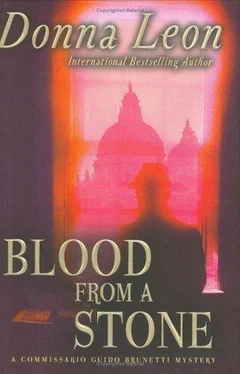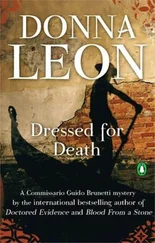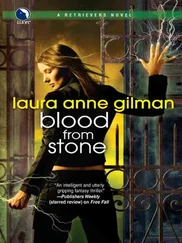Donna Leon - Blood from a stone
Здесь есть возможность читать онлайн «Donna Leon - Blood from a stone» весь текст электронной книги совершенно бесплатно (целиком полную версию без сокращений). В некоторых случаях можно слушать аудио, скачать через торрент в формате fb2 и присутствует краткое содержание. Год выпуска: 2005, Жанр: Детектив, на русском языке. Описание произведения, (предисловие) а так же отзывы посетителей доступны на портале библиотеки ЛибКат.
- Название:Blood from a stone
- Автор:
- Жанр:
- Год:2005
- ISBN:нет данных
- Рейтинг книги:4 / 5. Голосов: 1
-
Избранное:Добавить в избранное
- Отзывы:
-
Ваша оценка:
- 80
- 1
- 2
- 3
- 4
- 5
Blood from a stone: краткое содержание, описание и аннотация
Предлагаем к чтению аннотацию, описание, краткое содержание или предисловие (зависит от того, что написал сам автор книги «Blood from a stone»). Если вы не нашли необходимую информацию о книге — напишите в комментариях, мы постараемся отыскать её.
Blood from a stone — читать онлайн бесплатно полную книгу (весь текст) целиком
Ниже представлен текст книги, разбитый по страницам. Система сохранения места последней прочитанной страницы, позволяет с удобством читать онлайн бесплатно книгу «Blood from a stone», без необходимости каждый раз заново искать на чём Вы остановились. Поставьте закладку, и сможете в любой момент перейти на страницу, на которой закончили чтение.
Интервал:
Закладка:
‘Better have a look, then,’ Rizzardi said, turning towards the taped-off area. ‘You speak to anyone?’ he asked Brunetti.
‘No. Nothing.’ Talking to Alvise never counted.
Rizzardi bent and slipped under the tape, placing one hand on the pavement to do so, then held the tape up to make it easier for Brunetti to join him. The doctor turned to one of the technicians. ‘You’ve taken pictures?’
‘ Sì , Dottore,’ the man answered. ‘From every side.’
‘All right, then,’ Rizzardi said, setting down his bag. He turned away, took out two pairs of thin plastic gloves and gave one pair to Brunetti. As they slipped them on, the doctor asked, ‘Give me a hand?’
They knelt on either side of the dead man. All that was visible was the right side of his face and his hands. Brunetti was struck by the very blackness of the man’s skin, then bemused by his own surprise: what other colour did he expect an African to be? Unlike the black Americans Brunetti had seen, with their shading from cocoa to copper, this man was the colour of ebony buffed to a high gloss.
Together, they reached under the body and turned the man on to his back. The intense cold had caused the blood to congeal. Their knees anchored the sheet, so when they moved him, his jacket stuck to the cloth and pulled away from both his body and the pavement with a sharp sucking sound. Hearing it, Rizzardi let the man’s shoulder fall back on to the ground; Brunetti lowered his side, saying nothing.
Points of blood-stiffened cloth stood up on the man’s chest, looking like the whorls a pastry chef’s fantasy might create on a birthday cake.
‘Sorry,’ Rizzardi said, either to Brunetti or the dead man. Still kneeling, he bent over and used a gloved finger to touch each of the holes in his parka. ‘Five of them,’ he said. ‘Looks like they really wanted to kill him.’
Brunetti saw that the dead man’s eyes were open; so too was his mouth, frozen in the panic that must have filled him at the first shot. He was a handsome young man, his teeth gleaming in striking contrast to that burnished skin. Brunetti slipped one hand into the right-hand pocket of the man’s parka, then the left. He found some small change and a used handkerchief. The inside pocket contained a pair of keys and a few Euro bills in small denominations. There was a ricevuta fiscale from a bar with a San Marco address, probably one of the bars in the campo . Nothing else.
‘Who’d want to kill a vu cumprà ?’ Rizzardi asked, getting to his feet. ‘As if the poor devils don’t have enough as it is.’ He studied the man on the ground. ‘I can’t tell, looking at him like this, where they got him, but three of the holes are grouped pretty near the heart. One would have been enough to kill him.’ Stuffing his gloves into his pocket, Rizzardi asked, ‘Professional, you think?’
‘Looks like it to me,’ Brunetti answered, aware that this made the death even more confusing. He had never had to trouble himself with the vu cumprà because few of them were ever involved in serious crime, and those few cases had always fallen to other commissarios. Like most of the police, indeed, like most residents, Brunetti had always assumed that the men from Senegal were under the control of organized crime, the reason most often offered to explain their politeness in dealing with the public: so long as their manner did not call attention to them, few people would trouble to ask how they so successfully managed to remain invisible to and undisturbed by the authorities. Brunetti had come over the years no longer to notice them nor to remember when they had displaced the original French-speaking Algerian and Moroccan vu cumprà .
Though there was an occasional round-up and examination of documents, the vu cumprà had never attracted sufficient official attention to become the subject of one of Vice-Questore Patta’s ‘crime alerts’, which meant there had never been a serious attempt to address the patent illegality of their presence and their profession. They were left to ply their trade virtually untroubled by the forces of order, thus avoiding the bureaucratic nightmare that would surely result from any serious attempt to expel hundreds of undocumented aliens and return them to Senegal, the country from which most of them were believed to come.
Why then a killing like this, one that had the stamp of the professional all over it?
‘How old do you think he was?’ Brunetti asked for want of anything else to say.
‘I don’t know,’ Rizzardi answered with a puzzled shake of his head. ‘It’s hard for me to tell with blacks, not until I get inside them, but I’d guess in his early thirties, maybe younger.’
‘Do you have time?’ Brunetti asked.
‘Tomorrow afternoon, first thing. All right?’
Brunetti nodded.
Rizzardi leaned over and picked up his bag. Hefting it, he said, ‘I don’t know why I always bring this with me. It’s not as if I’m ever going to have to use it to save anyone.’ He thought about this, shrugged, and said, ‘Habit, I suppose.’ He put out his hand, shook Brunetti’s, and turned away.
Brunetti called to the technician who had taken the photos, ‘When you get him to the hospital, would you take a couple of shots of his face from different angles and get them to me as soon as you’ve got them developed?’
‘How many prints, sir?’
‘A dozen of each.’
‘Right. By tomorrow morning.’
Brunetti thanked him and waved over Alvise, who lurked just within earshot. ‘Did anyone see what happened?’ he asked.
‘No, sir.’
‘Who did you speak to?’
‘A man,’ Alvise answered, pointing in the direction of the church.
‘What was his name?’ Brunetti asked.
Alvise’s eyes widened in surprise he could not disguise. After a pause so long that anyone else would have found it embarrassing, the officer finally said, ‘I don’t remember, sir.’ At Brunetti’s silence, he protested, ‘He said he didn’t see anything, Commissario, so I didn’t need to take his name, did I?’
Brunetti turned to two white-coated attendants who were just arriving. ‘You can take him to the Ospedale, Mauro,’ he said. Then he added, ‘Officer Alvise will go with you.’
Alvise opened his mouth to protest, but Brunetti forestalled him by saying, ‘This way you can see if the hospital has admitted anyone with bullet wounds.’ It was unlikely, given the apparent accuracy of the five shots that had killed the African, but at least it would free him of Alvise’s presence.
‘Of course, Commissario,’ Alvise said, repeating his semi-salute. The officer watched as the two attendants stooped to pick up the body and place it on the stretcher, then led them back to their boat, walking purposefully, as though it was only through his intervention that they were sure of reaching it.
Turning, Brunetti called to a technician, who was now outside the taped circle, taking a close-up photo of the heel prints that led towards Rialto. ‘Is Alvise the only one who came?’
‘I think so, sir,’ the man answered. ‘Riverre was out on a domestic.’
‘Has anyone tried to find out if there were any witnesses?’ Brunetti asked.
The technician gave him a long look. ‘Alvise?’ was all he said before returning to his photos.
A group of teenagers stood against the wall of the garden. Brunetti approached them and asked, ‘Did any of you see what happened here?’
‘No, sir,’ one of them said, ‘we just got here now.’
Brunetti moved back to the cordoned area, where he saw three or four people. ‘Were any of you here when it happened?’ he asked.
Heads turned away, eyes glanced at the ground. ‘Did you see anything at all?’ he added, asking, not pleading.
Читать дальшеИнтервал:
Закладка:
Похожие книги на «Blood from a stone»
Представляем Вашему вниманию похожие книги на «Blood from a stone» списком для выбора. Мы отобрали схожую по названию и смыслу литературу в надежде предоставить читателям больше вариантов отыскать новые, интересные, ещё непрочитанные произведения.
Обсуждение, отзывы о книге «Blood from a stone» и просто собственные мнения читателей. Оставьте ваши комментарии, напишите, что Вы думаете о произведении, его смысле или главных героях. Укажите что конкретно понравилось, а что нет, и почему Вы так считаете.












